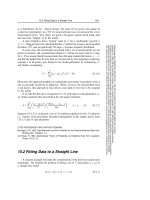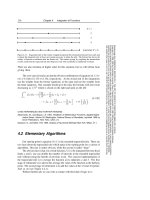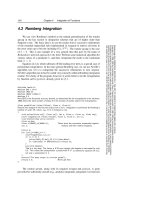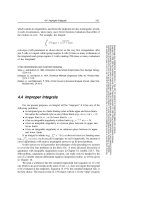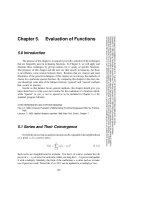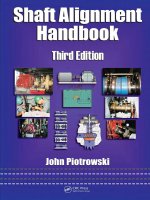Tài liệu Speaking of a Free Press docx
Bạn đang xem bản rút gọn của tài liệu. Xem và tải ngay bản đầy đủ của tài liệu tại đây (138.82 KB, 27 trang )
z
Speaking of a Free Press
Speaking of a
Free Press
200 Years of Notable Quotations About Press Freedoms
Published by
American Newspaper Association Foundation
(Now The Newspaper Association of America Foundation)
1987
Edited and Updated
2005
Speaking of a Free Press Page 2
_____________________ FOREWORD _____________________
A free press was born when America was born. It was not handed down or
inherited. The concept of press freedom was deliberately constructed by the framers of
our Constitution to instill the spirit of independence as an absolute, crucial ingredient in
the creation, existence and survival of a free society.
The collection of quotations in this booklet reflects the beliefs of prominent
people in our history who have championed freedom of the press – as well as some who
have opposed it. Contemporary leaders also are included; their words reaffirm the
important of press freedom in a truly free society.
As we celebrate the bicentennial of the Constitution, these quotations summarize
why we have fought and struggled for press freedom – and they reinforce the wisdom of
our forefathers in framing the basic principles under which our nation functions.
The meaning of it all is quite clear – a strong, free country and a strong, free press
are inseparable.
Jerry W. Friedheim
Executive Vice President
American Newspaper Publishers Association Foundation
1986
The quotations in this booklet have stood the test of time. They speak volumes
about the value placed on a free press by our democratic society.
We are living in a time when there are challenges to a free press not only from
those who want to suppress information, but also from those who have become
complacent about this valuable freedom. A recently released study by the John S. and
James L. Knight Foundation reports that nearly three-fourths of high school students tend
to express little appreciation for the First Amendment. The report continues to say that
most of their teachers, principals and parents have similar views.
We encourage you to promote knowledge of the First Amendment, especially
freedom of the press, whenever possible. Use these quotes to help reach that goal.
Jim Abbott
Vice President
Newspaper Association of America Foundation
2005
Speaking of a Free Press Page 3
Devious Foes of Freedom __________________________________________________
“Be not intimidated, therefore, by any terrors, from publishing with the utmost freedom whatever
can be warranted by the laws of your country, nor suffer yourselves to be wheeled out of your
library by any pretense of politeness, delicacy or decency. These, as they are often used, are but
three different names for hypocrisy, chicanery and cowardice.”
John Adams
From an Essay for the Boston Gazette
*1765
Free But Responsible ______________________________________________________
“The liberty of the press is indeed essential to the nature of a free state; but this consists in laying
no previous restraints upon publications, and not in freedom from censure for criminal matter
when published. Every free man has an undoubted right to lay what sentiments he pleases before
the public; to forbid this is to destroy the freedom of the press; but if he publishes what is
improper, mischievous or illegal, he must take the consequences of his own temerity.”
Blackstone’s Commentaries
1765
More Piercing Than Bayonets _____________________________________________
“A journalist is a grumbler, a censurer, a giver of advice, a regent of sovereigns, a tutor of
nations. Four hostile newspapers are more to be feared than a thousand bayonets.”
Napoleon Bonaparte
**[1769-1821]
The Fourth Estate __________________________________________________________
“There are three estates in Parliament but in the Reporters’ Gallery yonder there sits a Fourth
Estate more important far than they all. It is not a figure of speech or witty saying, it is a literal
fact, very momentous to us in these times.”
Attributed to Edmund Burke
English Statesman
[1739-1797]
_______
* Dates typeset in this manner represent the actual year in which the words were spoken or
written.
** Dates typeset in this manner represent dates of birth and death of the speaker or writer.
Speaking of a Free Press Page 4
Also attributed in 1828 to Thomas Maculey in this form:
“The Fourth Estate ranks in importance equally with the three estates of the realm, the Lords
Spiritual, the Lords Temporal and the Lords Common.”
Slavery Without Newspapers ______________________________________________
“With newspapers, there is sometimes disorder; without them, there is always slavery.”
Benjamin Constant
French writer
[1767-1830]
Physician, Heal Thyself ____________________________________________________
“The press must be free; it has always been so and much evil has been corrected by it. If
government finds itself annoyed by it, let it examine its own conduct and it will find the cause.”
Thomas Erskine
Scottish jurist
[1750-1823]
Basis of Our Rights ________________________________________________________
“What is the liberty of the press … its security, whatever fine declarations may be inserted in any
constitution respecting it, must altogether depend on public opinion, and on the general spirit of
the people and of the government. And here, after all … must we seek for the only solid basis of
all our rights.”
From the Federalist Papers #84
New York Independent Journal
1778-1788
Print Nothing, Offend Nobody _____________________________________________
“If all printers were determined not to print anything till they were sure it would offend nobody,
there would be very little printed.”
Benjamin Franklin
[1706-1790]
Speaking of a Free Press Page 5
Rule for Tyrants ___________________________________________________________
“Whoever would overthrow the liberty of a nation must begin by subduing the freedom of
speech.”
Benjamin Franklin
1722
Sell Not Liberty ____________________________________________________________
“Sell not virtue to purchase wealth, nor liberty to purchase power.”
Benjamin Franklin
1785
Formula for Safety _________________________________________________________
“When the press is free and every man able to read, all is safe.”
Thomas Jefferson
1799
The Best Enlightener ______________________________________________________
“The press is the best instrument for enlightening the mind of man, and improving him as a
rational, moral and social being.”
Thomas Jefferson
1823
Jefferson’s Choice ________________________________________________________
“The basis of our government being the opinion of the people, the very first object should be to
keep that right; and were it left to me to decide whether we should have a government without
newspapers, or newspapers without a government, I should not hesitate a moment to prefer the
latter. But I should mean that every man should receive those papers and be capable of reading
them.”
Thomas Jefferson
1787
Speaking of a Free Press Page 6
Press as Censor ____________________________________________________________
“No government ought to be without censors; and where the press is free no one ever will.”
Thomas Jefferson
1799
Impossible Combination ___________________________________________________
“If a nation expects to be both ignorant and free, it expects what never was and never will be.”
Thomas Jefferson
1816
The Basis of Popular Power _______________________________________________
“Nothing could be more irrational than to give the people power, and to withhold from them
information without which power is abused. A people who mean to be their own governors must
arm themselves with power which knowledge gives. A popular government without popular
information or the means of acquiring it is but a prologue to a farce or a tragedy, or perhaps
both.”
James Madison
[1751-1836]
Righter of Wrongs __________________________________________________________
“To the press alone, checkered as it is with abuses, the world is indebted for all the triumphs
which have been obtained by reason and humanity over error and oppression.”
James Madison
[1751-1836]
The Blessings of Freedom _________________________________________________
“Those who expect to reap the blessings of freedom must undergo the fatigue of supporting it.”
Thomas Paine
[1737-1809]
Speaking of a Free Press Page 7
When Reason Is Useless ___________________________________________________
“If men are to be precluded from offering their sentiments on a matter, which may involve the
most serious and alarming consequences that can invite the consideration of mankind, reason is of
no use to us, the freedom of speech may be taken away, and dumb and silent we may be led, like
sheep to the slaughter.”
George Washington
Address to Officers of the Army
March 15, 1783
Liberty’s Shield ____________________________________________________________
“The loss of liberty in general would soon follow the suppression of the liberty of the press; for it
is an essential branch of liberty, so perhaps it is the best preservative of the whole.”
John Peter Zenger
Colonial printer
1735
A Global Accounting _______________________________________________________
“We have the newspaper which does its best to make every square acre of land and sea give an
account of itself at your breakfast table.”
Ralph Waldo Emerson
1870
The Light That Exposes ___________________________________________________
“Not for its own sake alone, but for the sake of society and good government, the press should be
free. Publicity is the strong bond which unites the people and their government. Authority
should do no act that will not bear the light.”
James A. Garfield
[1831-1881]
To Make the Country Safe _________________________________________________
“Let the people know the facts, and the country will be safe.”
Abraham Lincoln
[1809-1865]
Speaking of a Free Press Page 8
A Newspaper’s Duty _______________________________________________________
“It is a newspaper’s duty to print the news, and raise hell.”
Wilbur Storey
Statement of the aims of the Chicago Times
1861
Take the Good with the Bad ______________________________________________
“In order to enjoy the inestimable benefits that liberty of the press ensures, it is necessary to
submit to the inevitable evils that it causes.”
Alexis de Tocqueville
French author of “Democracy in America”
1853
Censorship: Dangerous and Absurd ______________________________________
“In the countries in which the doctrine of the sovereignty of the people ostensibly prevails, the
censorship of the press is not only dangerous, but it is absurd. When the right of every citizen to
cooperate in the government of society is acknowledged, every citizen must be presumed to
possess the power of discriminating between the different opinions of his contemporaries, and of
appreciating the different facts from which inferences may be drawn.”
Alexis de Tocqueville
French author of “Democracy in America”
1853
Most Powerful Weapon ____________________________________________________
“The most powerful weapon of ignorance – the diffusion of printed matter.”
Leo Tolstoy
From “War and Peace”
Written between 1865 and 1869
Fatal to Despotism _________________________________________________________
“Given a free press, we may defy open or insidious enemies of liberty. It instructs the public
mind and animates the spirit of patriotism. Its loud voice suppresses everything which would
raise itself against the public liberty, and its blasting rebuke causes incipient despotism to perish
in the bud.”
Daniel Webster
Speaking of a Free Press Page 9
[1782-1852]
An Endless Education ______________________________________________________
“Newspapers are the schoolmasters of the common people. That endless book, the newspaper, is
our national glory.”
Henry Ward Beecher
American clergyman
[1813-1887]
The Ultimate Definition ____________________________________________________
“When a dog bites a man that is not news, but when a man bites a dog, that is news.”
John B. Bogart
City editor of The New York Sun
from 1873-1890
Wrong Job for Pollyanna ___________________________________________________
“A litterateur is not a confectioner, nor a dealer in cosmetics, not an entertainer. … He is just like
an ordinary reporter. What would you say if a newspaper reporter, because of his fastidiousness
or from a wish to give pleasure to his readers, were to describe only honest mayors, high-minded
ladies and virtuous railroad contractors?”
Anton Chekhov
Russian novelist and playwright
[1860-1904]
What to Print? ______________________________________________________________
“There is a great disposition in some quarters to say that the newspapers ought to limit the
amount of news they print; that certain kinds of news ought not to be published. I do not know
how that is. I am not prepared to maintain any abstract position on that line; but I have always
felt that whatever the divine Providence permitted to occur, I was not too proud to report.”
Charles A. Dana
Newspaper editor
[1819-1897]
Speaking of a Free Press Page 10
News and Non-News _______________________________________________________
“NEWS is that which comes from the North, East, West and South, and if it comes from only one
point of the compass, then it is a class publication and not news.”
Benjamin Disraeli
British prime minister
[1804-1881]
Liberty of Circulating ____________________________________________________
“Liberty of circulating is as essential to that freedom as liberty of publishing; indeed without the
circulation, the publication would be of little value.”
Justice Stephen J. Field
In an 1878 case involving the post office
Attributes of Citizenship ___________________________________________________
“I cannot assent to that view, if it be meant that the legislature may impair or abridge the rights of
a free press and of free speech whenever it thinks that the public welfare required that to be done.
The public welfare cannot override constitutional privileges, and if the rights of free speech and a
free press are, in their essence, attributes of national citizenship, as I think they are, then neither
Congress nor any state, since the adoption of the 14
th
amendment, can, by legislative enactments
or by judicial action, impair or abridge them.”
Justice John Marshall Harlan
U.S. Supreme Court
[1833-1911]
Why Tolerate Criticism? ___________________________________________________
“Why should freedom of speech and freedom of the press be allowed? Why should a government
which is doing what it believes to be right allow itself to be criticized? It would not allow
opposition by lethal weapons. Ideas are much more fatal things than guns. Why should any man
be allowed to buy a printing press and disseminate pernicious opinion calculated to embarrass the
government?”
Nikolai Lenin
1920
Speaking of a Free Press Page 11
Invisible but Inexorable ___________________________________________________
“The pressure of public opinion is like the pressure of the atmosphere; you can’t see it – but, all
the same, it is sixteen pounds to the square inch.”
James Russell Lowell
American poet, critic and diplomat
[1819-1891]
Speech Is Civilization ______________________________________________________
“Speech is civilization itself. The word, even the most contradictory word, preserves contact – it
is silence which isolates.”
Thomas Mann
From “The Magic Mountain”
[1875-1955]
Inseparable Destinies ______________________________________________________
“Our Republic and its press will rise or fall together. An able, disinterested, public-spirited press,
with trained intelligence to know right and courage to do it, can preserve that public virtue
without which popular government is a sham and a mockery.”
Joseph Pulitzer
Newspaper publisher and editor
[1847-1911]
Better Overdone Than Underdone _________________________________________
“If there is one thing we ought to be careful about, it is in regard to interfering with the liberty of
the press. … I think it is a great deal better to err a little bit on the side of having too much
discussion and having too virulent language used by the press, rather than to err on the side of
having them not say what they ought to say, especially with reference to public men and
measures.”
Theodore Roosevelt
[1858-1919]
Speaking of a Free Press Page 12
No Maybe About It _________________________________________________________
“The First Amendment does not speak equivocally. It prohibits any law ‘abridging freedom of
speech or of the press.’ It must be taken as a command of the broadest scope that explicit
language, read in the context of a liberty-loving society, will allow.”
Justice Hugo L. Black
U.S. Supreme Court
1929
A Subject, Not a Citizen ___________________________________________________
“If the press is not free, if speech is not independent and untrammeled, if the mind is shackled or
made impotent through fear, it makes no difference under what form of government you live, you
are a subject and not a citizen.”
U.S. Sen. William E. Borah
[1865-1940]
A Public Trust ______________________________________________________________
“The function of the press is very high. It is almost holy. It ought to serve as a forum for the
people, through which the people may know freely what is going on. To misstate or suppress the
news is a breach of trust.”
Justice Louis D. Brandeis
U.S. Supreme Court
[1856-1941]
A Chance to Be Better ____________________________________________________
“A free press can of course be good or bad, but most certainly without freedom it will never be
anything but bad. … Freedom is nothing else but a chance to be better, whereas enslavement is a
certainty of the worse.”
Albert Camus
French author
[1913-1960]
Speaking of a Free Press Page 13
Guardian of All Freedoms __________________________________________________
“A free press is the unsleeping guardian of every other right that free men prize; it is the most
dangerous foe of tyranny. … Under dictatorship the press is bound to languish, and the
loudspeaker and the film to become more important. But where free institutions are indigenous to
the soil and men have the habit of liberty, the press will continue to be the Fourth Estate, the
vigilant guardian of the rights of the ordinary citizen.”
Winston Churchill
[1874-1965]
In a less formal observation Churchill once said:
“I am always in favor of the free press but sometimes they say quite nasty things.”
Perils of Censorship _______________________________________________________
“Censorship always defeats its own purpose, for it creates in the end the kind of society that is
incapable of exercising real discretion.”
Henry Steele Commanger
Historian
1950
Dual Assignment ___________________________________________________________
“The job of the newspaper is to comfort the afflicted and afflict the comfortable.”
F.P. Dunne (Mr. Dooley)
American journalist and humorist
[1867-1936]
Balance of Power __________________________________________________________
“Without a free press there can be no free society … Without a lively sense of responsibility a
free press may readily become a powerful instrument of injustice.”
Justice Felix Frankfurter
In Penneckamp v. Florida
U.S. Supreme Court
1946
Speaking of a Free Press Page 14
Journalists: Uphold the Truth ____________________________________________
“I am a journalist myself and shall appeal to fellow journalists to realize their responsibility and
to carry on their work with no idea other than that of upholding the truth.”
Mahatma Gandhi
[1869-1948]
None of Their Business ____________________________________________________
“The organization of our press has truly been a success. Our law concerning the press is such that
divergences of opinion between members of the government are no longer an occasion for public
exhibitions, which are not the newspapers’ business. We’ve eliminated that conception of
political freedom which holds that everybody has the right to say whatever comes into his head.”
Adolf Hitler
[1889-1945]
Not as a Stepping Stone ___________________________________________________
“In college circles, journalism is thought of as a possible stepping stone to literature or political
life and not as a career that presents good opportunities in and of itself. If these colleges will
encourage young men to look toward journalism, there will be more well-equipped recruits whom
we can trust with the task of guiding the king of America – public opinion.”
H.V. Kaltenborn
Radio commentator and political analyst
[1878-1965]
No Nation Should Fear the Truth _________________________________________
“We are not afraid to entrust the American people with unpleasant facts, foreign ideas, alien
philosophies, and competitive values. For a nation that is afraid to let its people judge the truth
and falsehood in an open market is afraid of its people.”
John F. Kennedy
[1917-1963]
Speaking of a Free Press Page 15
An Invaluable Abrasive ____________________________________________________
“It is never pleasant to read things that are not agreeable news, but I would say that it is an
invaluable arm of the Presidency – to check really on what is going on in the administration. And
more things come to my attention that cause me concern or give me information. So I would
think that … there is a terrific disadvantage not to have the abrasive quality of the press applied to
you daily, to an administration, even though we never like it, and even though we wish they
didn’t write it, and even though we disapprove, there isn’t any doubt that we could not do the job
at all in a free society without a very, very active press.”
John F. Kennedy
[1917-0968]
Equal to Courts and then Some ___________________________________________
“In my opinion, the newspapers are equal to the courts – and sometimes ahead of the courts in our
system – in protecting the people’s fundamental rights.”
U.S. Sen. Robert F. Kennedy
[1925-1968]
The Trouble With Nibbling _________________________________________________
“Whenever you start nibbling away at freedom of the press, it’s hard to know when to stop.
We’ve got to have a free press, whether it’s responsible or not …”
Bernard Kilgore
Newspaper publisher
[1908-1967]
A Multitude of Tongues ____________________________________________________
“The First Amendment … presupposes that right conclusions are more likely to be gathered out
of a multitude of tongues, than through any kind of authoritative selection. To many this is, and
always will be, folly; but we have staked upon it our all.”
Judge Learned Hand
American jurist
[1873-1961]
Speaking of a Free Press Page 16
Pipeline to Government ____________________________________________________
“A free press is not a privilege but an organic necessity in a great society. Without criticism and
reliable and intelligent reporting, the government cannot govern. For there is no adequate way in
which it can keep itself informed about what the people of the country are thinking and doing and
wanting.”
Walter Lippmann
American columnist and author
[1889-1974]
The Truth Will Emerge _____________________________________________________
“The theory of a free press is that the truth will emerge from free reporting and free discussion,
not that it will be presented perfectly and instantly in any one account.”
Walter Lippmann
American columnist and author
[1889-1974]
The Daily Book _____________________________________________________________
“For the newspaper is in all literalness the bible of democracy, the book out of which a people
determines its conduct. It is the only serious book most people read. It is the only book they read
every day.”
Walter Lippmann
From “Liberty and the News”
1920
The Newspaper’s Functions _______________________________________________
“The newspaper is an institution developed by modern civilization to present the news of the day,
to foster commerce and industry through widely circulated advertisements and to furnish that
check upon government which no constitution has ever been able to provide.”
Col. Robert M. McCormick
Newspaper editor and publisher
[1880-1955]
Speaking of a Free Press Page 17
The First Freedom _________________________________________________________
“It is well to remember that freedom through the press is the thing that comes first. Most of us
probably feel we couldn’t be free without newspapers, and that is the real reason we want the
newspapers to be free.”
Edward R. Murrow
American broadcaster and public official
[1908-1965]
Privacy vs. Secrecy ________________________________________________________
“Never do anything in secret or anything that you would wish to hide. For the desire to hide
anything means that you are afraid, and fear is a bad thing and unworthy of you. … Privacy, of
course, we may have and should have, but that is a very different thing from secrecy.”
Jawaharlal Nehru
Indian statesman
[1889-1964]
Cornerstone of Freedom ___________________________________________________
“Freedom of conscience, of education, of speech, of assembly are among the very fundamentals
of democracy and all of them would be nullified should freedom of the press ever be successfully
challenged.”
Franklin D. Roosevelt
[1882-1945]
The Fires of Freedom ______________________________________________________
“If the fires of freedom and civil liberties burn low in other lands, they must be made brighter in
our own. If in other lands the press and books and literature of all kinds are censored, we must
redouble our efforts here to keep them free. If in other lands the eternal truths of the past are
threatened by intolerance, we must provide a safe place for their perpetuation.”
Franklin D. Roosevelt
1938
Speaking of a Free Press Page 18
A Mirror in the Ads _________________________________________________________
“The newspaper is a microcosm of the national life. This is as much the case in regard to
advertisements as to the letter-press. A glance over the advertising columns of a large … paper
shows reflected, as it were in a mirror, the whole of the active life of the people.”
W. Stead Jr.
Author of “The History of Advertising”
Date unknown
Why ehe Press Is Free _____________________________________________________
“The publisher is not granted the privilege of independence simply to provide him with a more
favored position in the community than is accorded to other citizens. He enjoys an explicitly
defined independence because it is the only condition under which he can fulfill his role, which is
to inform fully, fairly and comprehensively. The crux is not the publisher’s ‘freedom to print’; it
is rather the citizen’s ‘right to know.’ ”
Arthur Hays Sulzberger
New York Times publisher
[1891-1968]
Accuracy Equals Fairness ________________________________________________
“The first duty of a newspaper is to be accurate. If it be accurate, it follows that it is fair.”
Herbert Bayard Swope
Newspaper editor
Letter to the New York Herald Tribune
March 16, 1958
Free Debate of Ideas ______________________________________________________
“The basis of the First Amendment is the hypothesis that … free debate of ideas will result in the
wisest governmental policies.”
Chief Justice Fred M. Vinson
U.S. Supreme Court
1948
Why Rome Fell _____________________________________________________________
“The cause of the decline and fall of the Roman Empire lay in the fact that there were no
newspapers in that day. Because there were no newspapers there was no way by which the
dwellers in the far-flung nation and the empire could find out what was going on at the center.”
H. G. Wells
Historian and author
[1866-1946]
Speaking of a Free Press Page 19
A Plea for Intelligent Restraint ____________________________________________
“I have witnessed admirable restraint and judgment by journalists. I have been gratified by the
readiness of many of you to carefully consider sometimes withholding publication of information
which could jeopardize national interests or to treat or present a story in a manner which meets
the public need, yet minimizes potential damage to intelligence sources. The trick is to recognize
the potential for damage and to consult on how it might be minimized. We are always ready and
available on short notice to help on that.”
William J. Casey
Director of the Central Intelligence Agency
Speaking to the American Society of Newspaper Editors
1966
Let the Truth Come Out ___________________________________________________
“It is the purpose of the First Amendment to preserve an uninhibited marketplace of ideas in
which truth will ultimately prevail …”
Justice Byron White
U.S. Supreme Court
In Red Lion Broadcasting v. Federal Communication Commission
1969
Inconvenient _______________________________________________________________
“The First Amendment is often inconvenient. But that is beside the point. Inconvenience does
not absolve the government of its obligation to tolerate speech.”
Justice Anthony Kennedy
U.S. Supreme Court
[1936- ]
Otherwise, Truth Would Be Suppressed ___________________________________
“The First Amendment is not so construed as to award merit badges for intrepid but mistaken or
careless reporting. Misinformation has not merit in itself; standing alone it is antithetical to the
purposes of the First Amendment as the calculated lie; … The sole basis for protecting publishers
who spread false information is that otherwise the truth would too often be suppressed.”
Justice Byron White
U.S. Supreme Court
In Ocala Star-Banner Co. v. Damron
1970
Speaking of a Free Press Page 20
Basic to Democracy _______________________________________________________
“Freedom of the press is the staff of life for any vital democracy.”
Wendell Willkie
American lawyer, utility executive and political leader
[1892-1944]
Reality, Not Rhetoric ______________________________________________________
“I do not believe also in the abolition of free inquiry, or that the ideas represented by ‘freedom of
though,’ ‘freedom of speech,’ ‘freedom of press’ and ‘free assembly’ are just rhetorical myths. I
believe rather that they are among the most valuable realities that men have gained, and that if
they are destroyed men will again fight to have them.”
Thomas Wolfe
American author
[1900-1938]
The Watchdog of Society __________________________________________________
“If you want a watchdog to warn you of intruders, you must put up with a certain amount of
mistakened barking. Now and then he will sound off because a stray dog seems to be invading
his territory … or because he is outraged by a postman, and that kind of barking can, of course, be
a nuisance.
“But if you muzzle him and leash him and teach him decorum, you will find that he doesn’t do
the job for which you got him in the first place. Some extraneous barking it the price you must
pay for his service as a watchdog.
“A free press is the watchdog of a free society. And only a press free enough to be somewhat
irresponsible can possibly fulfill this vital function.”
Alan Barth
Columnist
[1906-1979]
Speaking of a Free Press Page 21
Democracy Tolerates Satire Well _________________________________________
“Since I write a humor column I have a vested interest in a free press. I don’t seem to have any
problem making fun of the President of the United States, the Cabinet, Congress, the CIA and the
FBI. I don’t know if our leaders read the column or not, but since I’ve been writing it I have had
no visits from anyone in a raincoat telling me I better knock it off.
“The people who attempt to do the same thing I am doing in 95 percent of the world are either in
gulags under house arrest or are jobless. For some reason not too many governments can handle
satire. My heroes in the world are the men and women in these countries who, knowing the
consequences, persist in holding up their leaders to ridicule.
“The problem, if there is a problem in this country, is because we have a free press people have
no idea what it’s like to live in a country that doesn’t.”
Art Buchwald
Columnist
[1925- ]
A Good Newspaper ________________________________________________________
“A good newspaper, I suppose, is a nation talking to itself.”
Arthur Miller
London Observer
November 26, 1961
Death of a Newspaper ____________________________________________________
“Every time a newspaper dies, even a bad one, the country moves a little closer to
authoritarianism; when a great one goes, like the New York Herald Tribune, history itself is
denied a devoted witness.”
Richard Kluger
from “The Paper: TheLife and Death of the New York Herald Tribune”
1986
A Journalistic Virtue ______________________________________________________
“Whatever else one may say about the newspaper business, self-examination is one of its virtues.
Searching questions about right conduct or wrong conduct are put whenever journalists gather.”
Marquis W. Childs
Newspaper columnist
[1903-1990]
Speaking of a Free Press Page 22
Freedom of Press Equals Democracy _____________________________________
“A democracy ceases to be a democracy if its citizens do not participate in its governance. To
participate intelligently, they must know what their government has done, is doing and plans to
do in their name. Whenever any hindrance, no matter what its name, is placed in the way of this
information, a democracy is weakened, and its future endangered. This is the meaning of
freedom of press. It is not just important to democracy, it is democracy.”
Walter Cronkite
Broadcast journalist
[1916- ]
Society’s Best Hope _______________________________________________________
“Even on the day we criticize it most, a free press is a society’s best hope to remain free.”
Roy Danish
Director, Television Information Office
1984
First Target of Tyranny ____________________________________________________
“There are very few friends of a free press in the world. Year by year those countries which
enjoy a free press grow fewer in number. Because a free press is the deadliest enemy of tyranny,
it is the first target of tyrannical governments everywhere.”
Mark S. Fowler
Chairman, Federal Communications Commission
1981
Strong Free Press __________________________________________________________
“A strong, free country and a strong, free press are inseparable.”
Jerry W. Friedheim
American Newspaper Publishers Association
1976
The Need to Censor _______________________________________________________
“When there are no papers, there is no agitation. That is why we imposed censorship.”
Indira Gandhi
[1917-1984]
Speaking of a Free Press Page 23
On Freedom of the Mind ___________________________________________________
“Freedom is always the exception, never the rule. Of all human beings, who have lived on this
earth, only a few have lived in freedom. For the anonymous millions living private lives in this
country today, the First Amendment, above all else, is the constitutional expression in their behalf
of the greatest of all human values: freedom of the mind.”
Philip Kerby
Editorial writer, Los Angeles Times
[1911- ]
Worse Than Bad News: No News ________________________________________
“The one thing that’s worse than hearing about all that violence and all that bad news on
television is not being permitted to hear it.”
Charles Kurault
Broadcast journalist
[1934-1997]
All in the Family ____________________________________________________________
“The press is like the peculiar uncle you keep in the attic – just one of those unfortunate things.”
G. Gordon Liddy
Watergate co-conspirator
January 12, 1987
On Responsible Journalism ________________________________________________
“The media can, and should, be much better. The media need to care about values. I’ve had
some very sharp disagreements with First Amendment absolutists who say that all the media have
to do is report; values are somebody else’s business.
“I don’t believe that’s true. And the choice of what we say and how we say it, what we report –
we do have an impact, and we need to care what that impact is. Journalists need to be more
committed to objectivity and thoroughness and accuracy and fairness. We need to respect other
people’s privacy, whether those people are public figures or private figures. … We need to do
these things because they are decent and because they are right and because if we don’t, people
are going to reject the very rights that are essential to their own freedoms.
“Media can’t correct all the problems that are faced by families and individuals, but what we can
do is bring those problems into the open where they can be discussed, examined and dealt with.
That is the media’s job. And I would rather have it done by all those separate voices called the
media than by any single voice called government.”
Jean Otto
Editorial page editor, Rocky Mountain News
1983
Speaking of a Free Press Page 24
A Clear Choice _____________________________________________________________
“Given the choice between government regulators and the journalistic judgments of free men and
women, we must choose the latter, or we court tyranny.”
U.S. Sen. Robert Packwood
1984
All and Nothing at All ______________________________________________________
“A journalist owes nothing to those who govern his country. He owes everything to his country.”
Vermont Royster
Newspaper editor
[1914-1996]
Speaking from Experience _________________________________________________
“As long as a country has no civil liberty and freedom of information and no independent press,
then there exists no effective body of public opinion to control the conduct of government.”
Andrei D. Sakharov
(Written from exile)
[1921-1989]
Let There Be Light _________________________________________________________
“The government is not a fungus and can thrive only in the sunlight.”
U.S. Rep. Patricia Schroeder
1984
Freedom vs. Right to Privacy ______________________________________________
“If the rash of lawsuits (for libel and invasion of privacy) makes us more careful, more
compassionate and more sensitive to people and their needs, they may not be all bad.
“But if they keep us from being aggressive and fulfilling our responsibilities to our readers, to our
communities and our country, they will remove one of the major checks in our Constitution’s
marvelous set of checks and balances.”
Thomas Schumaker
Editor and publisher, Transcript-Telegram, Holyoke, Mass.
1984




